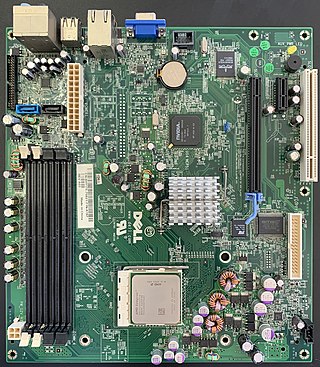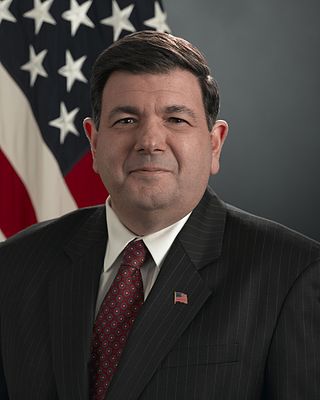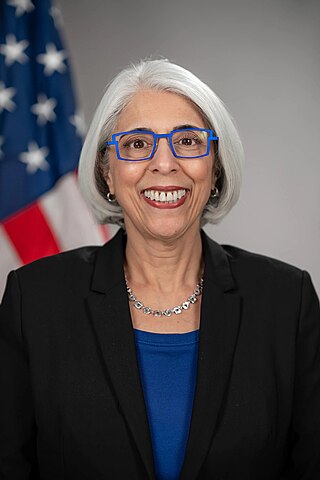Related Research Articles

Electrical engineering is an engineering discipline concerned with the study, design, and application of equipment, devices, and systems that use electricity, electronics, and electromagnetism. It emerged as an identifiable occupation in the latter half of the 19th century after the commercialization of the electric telegraph, the telephone, and electrical power generation, distribution, and use.

An integrated circuit (IC), also known as a microchip, computer chip, or simply chip, is a small electronic device made up of multiple interconnected electronic components such as transistors, resistors, and capacitors. These components are etched onto a small piece of semiconductor material, usually silicon. Integrated circuits are used in a wide range of electronic devices, including computers, smartphones, and televisions, to perform various functions such as processing and storing information. They have greatly impacted the field of electronics by enabling device miniaturization and enhanced functionality.

Computer engineering is a branch of electrical engineering that integrates several fields of electrical engineering, electronics engineering and computer science required to develop computer hardware and software. Computer engineering is referred to as Electrical and Computer engineering OR Computer Science and Engineering at some universities

Xidian University is a public university in Xi'an, Shaanxi, China. It is affiliated with the Ministry of Education, and co-funded by the Ministry of Education, the Ministry of Industry and Information Technology, SASTIND, and China Electronics Technology Group Corporation. The university is part of the Double First-Class Construction and Project 211.
Engineering physics (EP), sometimes engineering science, is the field of study combining pure science disciplines and engineering disciplines.
This article details the history of electrical engineering.
Behzad Razavi is an Iranian-American professor and researcher of electrical and electronic engineering. Noted for his research in communications circuitry, Razavi is the director of the Communication Circuits Laboratory at the University of California Los Angeles. He is a Fellow and a distinguished lecturer for the Institute of Electrical and Electronics Engineers. Among his awards, Razavi is a two-time recipient of the Beatrice Winner Award for Editorial Excellence at the 1994 and 2001 International Solid-State Circuits Conferences. In 2017, he was elected as a member into the National Academy of Engineering for contributions to low-power broadband communication circuits.
Ann Catrina Coleman is a Scottish electrical engineer and professor at the University of Texas at Dallas specialising in semiconductor lasers.
Evelyn L. Hu is the Tarr-Coyne Professor of Applied Physics and of Electrical Engineering at Harvard University. Hu has made major contributions to nanotechnology by designing and creating complex nanostructures. Her work has focused on nanoscale devices made from compound semiconductors and on novel devices made by integrating various materials, both organic and inorganic. She has also created nanophotonic structures that might someday facilitate quantum computing.
Ming C. Lin is an American computer scientist and a Barry Mersky and Capital One Endowed Professor at the University of Maryland, College Park, where she is also the former chair of the Department of Computer Science. Prior to moving to Maryland in 2018, Lin was the John R. & Louise S. Parker Distinguished Professor of Computer Science at the University of North Carolina at Chapel Hill.

Zachary John Lemnios is an American scientist, executive, and engineer who has worked in government, industry, and academia. Most notably, he held the post of Assistant Secretary of Defense for Research and Engineering from 2009 to 2012, and he has served as the first Chief Technology Officer of MIT Lincoln Laboratory, and as Vice President of Research at IBM. Lemnios later founded ZJL Consulting, LLC.

Siegfried Selberherr is an Austrian scientist in the field of microelectronics. He is a professor at the Institute for Microelectronics of the Technische Universität Wien . His primary research interest is in modeling and simulation of physical phenomena in the field of microelectronics.

Arati Prabhakar is an American engineer and public official. Since October 3, 2022, she has served as the 12th director of the White House Office of Science and Technology Policy and the Science Advisor to the President.

Mona Jarrahi is an Iranian Engineering professor at the University of California, Los Angeles. She investigates novel materials, terahertz/millimeter-wave electronics and optoelectronics, microwave photonics, imaging and spectroscopy systems.
Santosh Kurinec is an IEEE fellow and a professor of Electrical & Microelectronic Engineering at Kate Gleason College of Engineering in Rochester Institute of Technology (RIT). She is an Indian American electronic engineer specializing in electronic materials and devices. She is a former IEEE Electron Devices Society distinguished lecturer. In 2018, she was inducted into the Women in Technology International (WITI) Hall of Fame.
Ingrid Verbauwhede is a professor at the COSIC Research Group of the Electrical Engineering Department, KU Leuven, where she leads the embedded systems team. She is a pioneer in the field of secure embedded circuits and systems, with several awards recognising her contributions to the field. She is member of the Royal Flemish Academy of Belgium for Science and the Arts since 2011. She is a fellow of IEEE.
Marija D. Ilić is a Serbian-American electrical engineer known for her work on the control and pricing of large electrical power systems. She is a professor emerita of electrical and computer engineering at Carnegie Mellon University, a senior research scientist at the Laboratory for Information & Decision Systems at the Massachusetts Institute of Technology, a senior staff member at the MIT Lincoln Laboratory, and the founding chief scientist of New Electricity Transmission Software in Massachusetts.
Alice Elizabeth White is an American physicist. She is a professor and chair at the Boston University College of Engineering. Previously, she was Chief Scientist at Bell Labs. She is a fellow of the APS, the IEEE and the OSA.
Alice Cline Parker is an American electrical engineer. Her early research studied electronic design automation; later in her career, her interests shifted to neuromorphic engineering, biomimetic architecture for computer vision, analog circuits, carbon nanotube field-effect transistors, and nanotechnology. She is Dean's Professor of Electrical and Computer Engineering in the USC Viterbi School of Engineering of the University of Southern California.
April S. Brown is an American electrical engineer and materials scientist at the Duke University Pratt School of Engineering, where she is a professor of electrical and computer engineering and the former John Cocke Professor of Electrical and Computer Engineering.
References
- 1 2 3 "Leda Lunardi", People, NC State University Electrical and Computer Engineering, retrieved 2021-07-16
- 1 2 "Leda Lunardi", Women in Science: Conversations on Gender Equity, Springer Nature, retrieved 2021-07-16
- ↑ Lunardi, Leda (2020), "Heterojunction bipolar transistors and monolithically integrated photoreceivers among other applications", in Lunardi, Leda; Parker, Alice Cline (eds.), Women in Microelectronics, Women in Engineering and Science, Springer International Publishing, pp. 117–132, doi:10.1007/978-3-030-46377-9_8, ISBN 978-3-030-46893-4, S2CID 226415936
- ↑ "Leda Lunardi", ORCID, retrieved 2021-07-16
- ↑ IEEE Fellows directory, IEEE, retrieved 2021-07-16